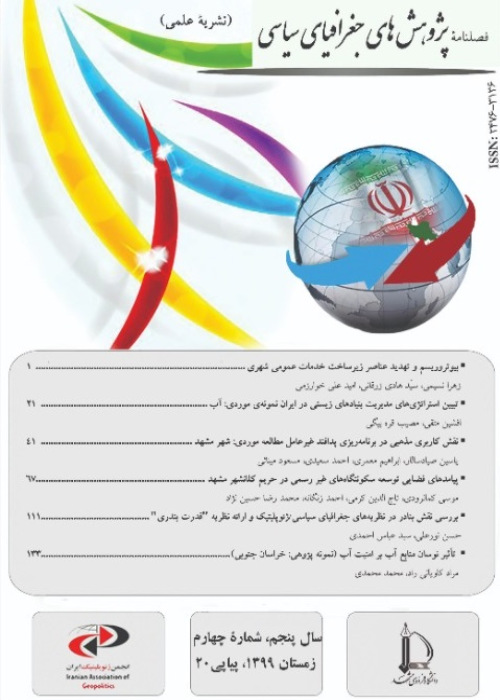Strategies for Achieving Spatial/Geographic Justice in Iran
Generally, spatial injustice which can be a threat for national security and evolution of critical areas refers to an imbalanced distribution of society’s valuable properties such as political-executive power, wealth and opportunity resources. Spatial injustice is the most important feature of Iran’s spatial organization which is seen in the center-periphery structure of the country from local to national scales. Due to the threats and current complicated conditions, an effort to achieve spatial justice is one of the main research priorities in political geography.A democratic approach to spatial justice provides equality for all residents of a geographic space to enjoy the resources, opportunities and infrastructures through their participation in the decision-making processes. Spatial justice is realized when power, wealth and opportunities are distributed proportionally with the potentialities of the micro- and macro-spaces and places. As a result, the interests empowering societies to meet their needs increase and the coefficient between the regions increases. Space and humans are the focal point of human geographical thought and of political geography.Equal access of all residents of a geographic space to the main factors like power, opportunity and wealth at micro- and macro-levels form the axis of spatial justice in political geography.
Mohamadi, Rasoli and Dastineh (2016)
This research uses descriptive-analytic method based on a literature review and field findings to codify method to reach geographic and spatial justice in Iran. The literature review was used to determine the effective factors in spatial injustice in Iran. In the field findings, the facets and indices of spatial justice are categorized and standardized to measure the Iranian situation. The pillars of spatial injustice are characterized and categorized from the perspective of the statistical population based on the average score to codify methods of reaching geographic and spatial justice in Iran.
The results of the research show that spatial justice in Iran is due to the operation of a wide range of factors as follows: Natural geography and unequal distribution of biological foundation (Inherent characteristics);
- Human geography and spatial structure of the nation;- The political system, policy making, and planning for national development (casual properties);- Regional and global geopolitical environment.The research results show that the most important foundation of spatial injustice in Iran are as follows: inequality in the distribution of power, wealth and opportunity resources, the weakness of budgeting system, the weakness of regional and local system management, spatial justice is not a general demand, Institutionalized centralization are the factors with high level of impact and unbalanced natural foundations, thetheoretical weakness in the field of spatial justice studies, the weakness of regional and national information and accounting system as the factors with lower impact.
In order to access spatial justice, the following strategies are proposed as a policy agenda:- Optimal spatial distribution of wealth flow as development prerequisite (management of money flow);- Allocation of special budget in provincial budgets for balanced development in order to achieve regional balance;- Strengthening the local potential of the regions in order to increase in efficiency to achieve balanced development;- Attention to the systemic thinking of spatial justice in local, regional and national levels;- Revision of the 27 principles of the constitution related to the concentration of affairs.
- حق عضویت دریافتی صرف حمایت از نشریات عضو و نگهداری، تکمیل و توسعه مگیران میشود.
- پرداخت حق اشتراک و دانلود مقالات اجازه بازنشر آن در سایر رسانههای چاپی و دیجیتال را به کاربر نمیدهد.



